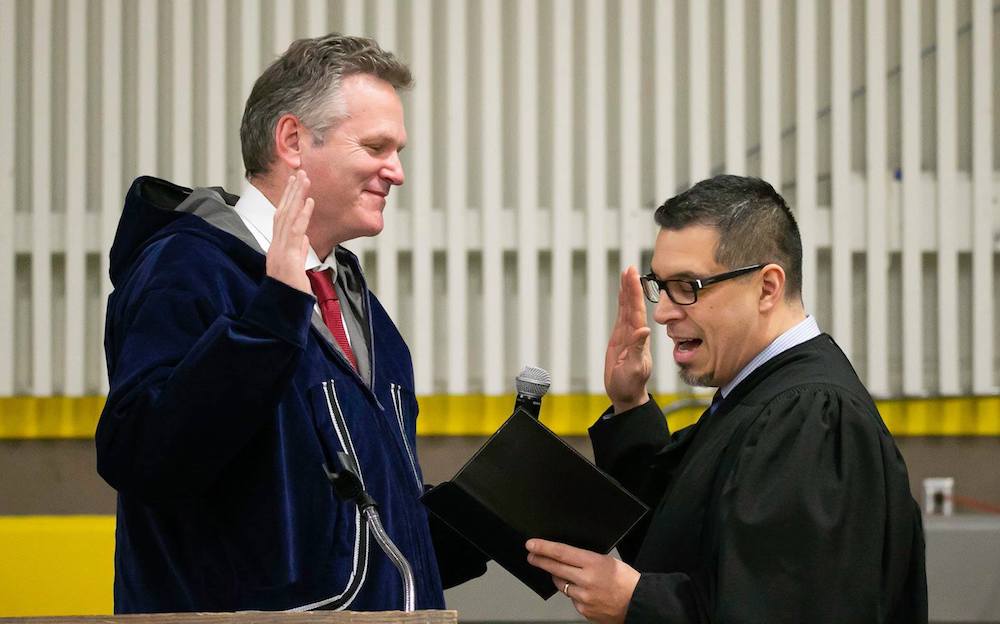Alaska’s new governor travels to Arctic for swearing-in ceremony
On first day in office, Republican Mike Dunleavy pledges to work for rural Alaskans, begins effort to roll back spending on climate-change programs.

Alaska’s new governor was sworn into office on Monday in Kotzebue, making him the state’s first governor to formally assume office above the Arctic Circle.
Republican Mike Dunleavy had planned to do the swearing-in ceremony in the Inupiat village of Noorvik, the hometown of his wife, Rose. But bad weather delayed his flight to Noorvik, so local residents in the larger hub city set up an impromptu ceremony so that the new governor could assume office at the appointed time of noon.
Dunleavy, a former teacher, principal and superintendent who has worked in Kotzebue and elsewhere in northwestern Alaska, told members of the Kotzebue audience and elsewhere in the rural parts of the state that he had a special bond with them. “You have a friend in the governor’s office. You have somebody that hasn’t just visited rural Alaska, hasn’t just read about rural Alaska,” he said in his speech. “You aren’t going to be an afterthought. You’re going to be a forethought, along with urban Alaska.”
[Alaska’s new governor will face a daunting financial challenge]
He spoke about resource extraction, promoting mining as a way to diversify the economy away from its dependence on oil production.
“For many, many years, we were the oil capital of the United States. North Slope oil was pumping about 2 million barrels per day. We’re down to about 540,000 barrels per day. So, yes, we have less oil. But we have incredible opportunities,” he said. “You’re going to see more mining opportunities, more opportunities in mines, more opportunities in tourism. We’re going to diversify this economy.”
Dunleavy may have overstated the current level of North Slope oil production. According to Alyeska Pipeline Service Co., the operator of the Trans Alaska Pipeline System, average to date daily throughput of North Slope oil in 2018 is 506,094 barrels.
In his speech, Dunleavy did not mention the Arctic, and he did not mention climate change.
During the campaign, Dunelavy, a former legislator representing Wasilla, criticized his predecessor, Bill Walker, for using state resources to combat climate change and prepare for its effects. And during the campaign, Dunleavy said repeatedly that to save state money, he would cut funding for state climatologists.
[Alaska climate team’s plan seeks to fill void left by federal government]
Alaska has a state climatologist, as required by state law. The position is currently held by Martin Stuefer, director of the Alaska Climate Research Center at the University of Alaska Fairbanks.
One of the first actions taken by the new administration – on the day Dunleavy was sworn into office – was removal of the website of the Climate Action Leadership Team appointed by Walker. On that website were reports and recommendations from the group.
Jeff Turner, a spokesman for the new administration, said the information technology system was responsible for that action, and that it should not be considered a policy decision.
“The climate action webpage was taken down by the state’s IT department. The page was branded for the previous governor and pulling down webpages branded for the previous governor is a normal part of the process during a change in administrations,” Turner said in an email. “There are still outstanding policy decisions to be made. The climate policy team and other policy decisions will take a little time to sort out.”
Yereth Rosen is a 2018 Alicia Patterson Foundation fellow.